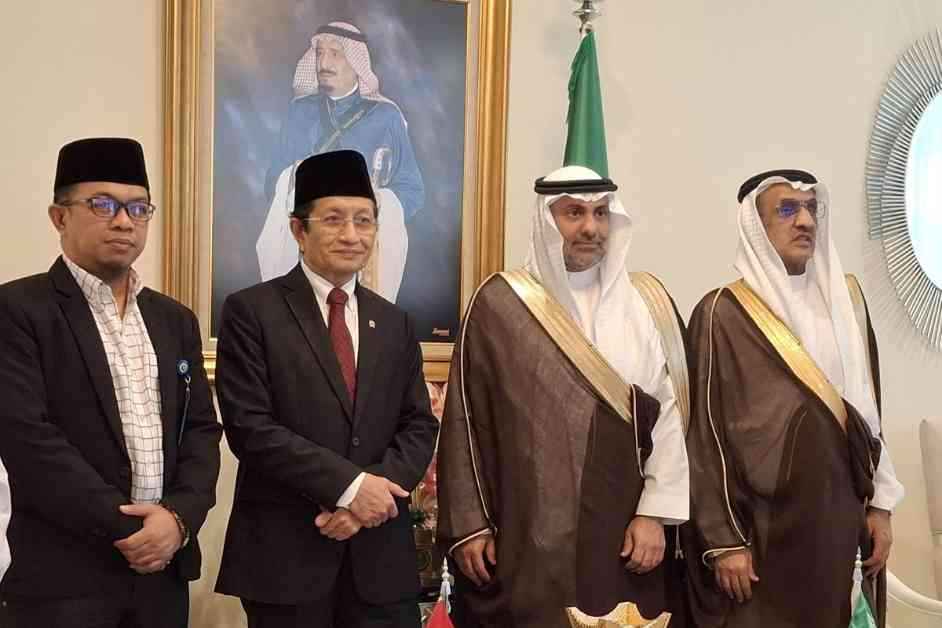Minister of Religious Affairs, Nasaruddin Umar, recently made a compelling request to the government of Saudi Arabia to increase the number of Indonesian Hajj officers from 2,210 to 4,000. This proposal aims to elevate the level of service provided to Indonesian Hajj pilgrims during their sacred journey. The minister’s plea came following a productive meeting with Saudi Minister of Health, Fahd Abdulrahman Al-Jalajel, and Saudi Arabian Ambassador to Indonesia, Faisal bin Abdullah Al-Amudi, on a bustling Monday in Jakarta.
During this crucial meeting, Minister Nasaruddin emphasized the importance of having a larger team of Hajj officers to cater to the needs of Indonesian pilgrims effectively. He highlighted the significance of language proficiency, stating, “That would make it easier for us to serve our people because we can understand their local language, their regional language.” By having a larger number of officers who are well-versed in the language and culture of Indonesian pilgrims, the quality of service provided can be significantly enhanced.
Moreover, Minister Nasaruddin underscored that the presence of additional Hajj officers would not only benefit Indonesian pilgrims but also assist the Saudi Arabian government in delivering services to all Hajj pilgrims, particularly those from Indonesia. This collaborative approach underscores the importance of international cooperation in ensuring a smooth and fulfilling Hajj experience for all pilgrims.
In his appeal to the Saudi government, Minister Nasaruddin also advocated for a shift in the criteria for selecting Hajj officers. Instead of focusing solely on age, he proposed prioritizing physical ability as the primary determinant. He remarked, “Because in Indonesia, there are people over 90 years old who are still very strong. But, there are also those under 90 years who are already weak.” This shift in perspective aims to ensure that the most capable individuals are selected to serve as Hajj officers, thereby enhancing the overall efficiency and effectiveness of the pilgrimage process.
Furthermore, Minister Nasaruddin suggested that if the age requirement for selecting Hajj officers is revised, the ministry should be granted a one-year grace period to educate the public about these changes. This proactive approach demonstrates a commitment to transparency and inclusivity in the selection process, ensuring that all eligible candidates have the opportunity to participate.
The minister expressed gratitude for the positive response received from the Saudi government regarding his proposals. He stated, “Alhamdulillah, our suggestions were taken into serious consideration.” This acknowledgment reflects the spirit of collaboration and mutual respect between Indonesia and Saudi Arabia in enhancing the welfare and experience of all Hajj pilgrims.
Expert Insights on Enhancing Hajj Services
To gain further insights into the importance of increasing the number of Hajj officers and improving service quality for Indonesian pilgrims, we spoke with Dr. Hana Fitriana, an expert in Islamic studies and pilgrimage practices. Dr. Fitriana emphasized the critical role that Hajj officers play in facilitating a smooth and meaningful pilgrimage experience for all pilgrims. She stated, “Having a larger team of well-trained officers who understand the cultural nuances and needs of Indonesian pilgrims is essential in ensuring a successful Hajj journey.”
Dr. Fitriana also highlighted the significance of prioritizing physical ability over age in selecting Hajj officers. She noted, “By focusing on physical capability, we can ensure that the individuals serving as officers are best equipped to handle the demands of the pilgrimage and provide adequate support to all pilgrims, regardless of their age.” This shift in criteria aligns with international best practices and aims to enhance the overall quality of service provided to all pilgrims.
In conclusion, Minister Nasaruddin’s request to increase the number of Indonesian Hajj officers to 4,000 represents a significant step towards enhancing the quality of service and support provided to Indonesian pilgrims. By emphasizing the importance of language proficiency, cultural understanding, and physical capability in selecting Hajj officers, Indonesia aims to ensure a more inclusive and effective Hajj experience for all pilgrims. This collaborative effort between Indonesia and Saudi Arabia underscores the shared commitment to promoting the well-being and welfare of all Hajj pilgrims, reflecting the spirit of unity and cooperation that defines the sacred journey of Hajj.






















